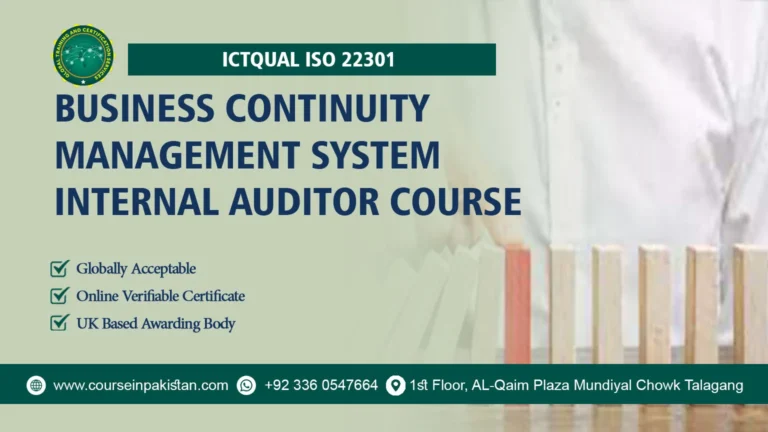
The ICTQual AB Level 6 International Diploma in Logistics and Supply Chain Technology is designed to equip learners with advanced knowledge and practical skills to manage, optimize, and innovate within the logistics and supply chain sector. In today’s highly competitive global market, businesses rely heavily on efficient supply chains, modern logistics strategies, and cutting-edge technologies to maintain a competitive edge. This diploma empowers learners to master essential areas such as procurement, warehousing, transportation, supply chain integration, sustainability, and digital transformation in logistics.
Through a comprehensive curriculum, learners gain a deep understanding of the complexities of global supply chains, risk management, international trade, and advanced logistics systems. With a focus on real-world applications, this program bridges the gap between theoretical concepts and industry practices, preparing graduates to take on leadership roles in logistics and supply chain management.
Course Overview
The ICTQual AB Level 6 International Diploma in Logistics and Supply Chain Technology is a 360-credit qualification that is completely assignment-based, offering learners the flexibility to study at their own pace from anywhere in the world. This diploma is British Council verifiable, MOFA and Embassy attested, making it an excellent choice for career advancement, international job opportunities, and iqama approval.
This qualification is suitable for both fresh and experienced candidates. Fresh students are required to complete all 36 mandatory assignments within three years, ensuring they gain comprehensive knowledge and skills. On the other hand, experienced and competent professionals with at least six years of verifiable relevant experience can achieve this certification by defending their knowledge in professional discussion meetings with an ICTQual AB Approved Assessor, enabling them to earn the diploma in a shorter time without completing all mandatory assessments.
Key Highlights of the Course:
- 360-credit, assignment-based international diploma designed for flexible learning
- British Council verifiable, MOFA and Embassy attested qualification for global recognition
- Suitable for both fresh students and experienced professionals with industry experience
- Comprehensive coverage of logistics, supply chain, procurement, and emerging technologies
- Globally relevant program designed for career growth, job approval, and international mobility
Course Benefits
Global Recognition
- Qualification is British Council verifiable and MOFA/Embassy attested, ensuring acceptance for international employment and job approvals.
Career Advancement
- Opens opportunities for roles such as supply chain manager, logistics coordinator, procurement officer, and warehouse operations manager.
Flexible Learning Pathways
- Fresh learners gain structured knowledge through assignments, while experienced professionals can fast-track certification through prior experience recognition.
Industry-Relevant Knowledge
- Curriculum is designed to meet the latest demands of logistics and supply chain technology, covering both traditional and digital supply chain models.
International Mobility
- Attestation and recognition make the diploma highly valuable for iqama approval and career progression abroad.
Practical Skill Development
- Learners gain real-world skills in logistics optimization, supply chain integration, risk management, and the use of emerging technologies like automation and AI.
Course Study Units
This qualification, the ICTQual AB Level 6 International Diploma in Logistics & Supply Chain Technology, consists of 36 mandatory units.
Year 1 – Foundations of Logistics & Supply Chain
- Introduction to Logistics and Supply Chain Management
- Principles of Transport and Distribution
- Inventory Management and Control Systems
- Procurement and Supplier Management
- Basics of Warehouse Operations
- Supply Chain Economics and Policy
- Fundamentals of Risk Management in Logistics
- Business Communication and Professional Ethics
- Introduction to Global Trade and Regulations
- Sustainability and Environmental Management in Supply Chains
- Information Systems in Logistics
- Introduction to Project Management
Year 2 – Applied Logistics Operations & Management
- Advanced Supply Chain Planning and Scheduling
- Freight and Transportation Management
- Procurement Strategy and Supplier Evaluation
- Warehouse and Inventory Optimisation Techniques
- Logistics Technology and Digitalisation
- Safety, Compliance, and Risk Mitigation in Operations
- Logistics Performance Measurement and KPIs
- Lean and Six Sigma Applications in Supply Chains
- Global Logistics and International Trade Management
- Human Resource and Team Management in Logistics
- Applied Case Studies in Supply Chain Management
- Simulation Exercises in Logistics Operations
Year 3 – Strategic Leadership & Advanced Supply Chain Management
- Strategic Supply Chain Management
- Leadership and Decision-Making in Logistics
- Advanced Procurement and Contract Management
- Global Supply Chain Integration and Coordination
- Transport Network Design and Optimisation
- Risk Management and Crisis Response in Supply Chains
- Sustainability, Circular Economy, and Green Logistics
- Emerging Technologies and Innovation in Supply Chains
- Data Analysis and Research Methods for Logistics
- Independent Research Project in Logistics & Supply Chain
- Capstone Project: Applied Strategic Supply Chain Management
- Performance Audit and Continuous Improvement Strategies
Learning Outcomes
Year 1 – Foundations of Logistics & Supply Chain
Introduction to Logistics and Supply Chain Management
- Understand the core principles, scope, and functions of logistics and supply chain systems.
- Demonstrate knowledge of end-to-end supply chain flows, including sourcing, production, and distribution.
Principles of Transport and Distribution
- Analyse different modes of transport and their impact on cost, efficiency, and delivery.
- Apply distribution principles to optimise routing, scheduling, and resource allocation.
Inventory Management and Control Systems
- Apply inventory control models to balance demand and supply effectively.
- Evaluate stock management systems to minimise costs and reduce waste.
Procurement and Supplier Management
- Develop procurement strategies aligned with organisational goals.
- Assess supplier performance and build sustainable supplier relationships.
Basics of Warehouse Operations
- Demonstrate knowledge of warehouse design, layout, and material handling systems.
- Apply safe and efficient practices for inventory storage and movement.
Supply Chain Economics and Policy
- Analyse economic factors influencing logistics and trade.
- Evaluate the role of policies, tariffs, and regulations in global supply chains.
Fundamentals of Risk Management in Logistics
- Identify potential risks in logistics operations and their impacts.
- Propose risk mitigation strategies to ensure supply chain resilience.
Business Communication and Professional Ethics
- Demonstrate effective communication in professional logistics settings.
- Apply ethical standards and practices in decision-making.
Introduction to Global Trade and Regulations
- Understand the fundamentals of global trade systems, customs, and tariffs.
- Apply compliance requirements to international supply chain activities.
Sustainability and Environmental Management in Supply Chains
- Analyse environmental challenges in logistics and supply chain management.
- Propose sustainable practices to reduce carbon footprint and improve efficiency.
Information Systems in Logistics
- Use logistics information systems (LIS) to track, analyse, and report data.
- Evaluate how technology improves supply chain visibility and decision-making.
Introduction to Project Management
- Understand project planning, scheduling, and monitoring techniques.
- Apply project management tools in logistics-related projects.
Year 2 – Applied Logistics Operations & Management
Advanced Supply Chain Planning and Scheduling
- Apply forecasting and planning models to optimise resource utilisation.
- Integrate demand, capacity, and scheduling to enhance supply chain efficiency.
Freight and Transportation Management
- Evaluate freight management strategies for domestic and international operations.
- Apply cost-effective solutions to optimise transportation networks.
Procurement Strategy and Supplier Evaluation
- Develop procurement strategies that enhance competitiveness.
- Use evaluation tools to assess supplier performance and compliance.
Warehouse and Inventory Optimisation Techniques
- Apply advanced techniques to improve warehouse efficiency and accuracy.
- Use automation and lean methods to optimise inventory levels.
Logistics Technology and Digitalisation
- Assess the role of digital tools such as IoT, blockchain, and AI in logistics.
- Demonstrate how digitalisation enhances transparency and efficiency.
Safety, Compliance, and Risk Mitigation in Operations
- Apply health, safety, and compliance standards in logistics environments.
- Implement risk management frameworks to reduce operational hazards.
Logistics Performance Measurement and KPIs
- Identify and track key performance indicators in logistics systems.
- Analyse performance data to support continuous improvement.
Lean and Six Sigma Applications in Supply Chains
- Apply lean principles to eliminate waste in logistics processes.
- Use Six Sigma methodologies to improve quality and reduce variability.
Global Logistics and International Trade Management
- Analyse the complexities of managing logistics in global markets.
- Apply trade management practices to ensure compliance and efficiency.
Human Resource and Team Management in Logistics
- Demonstrate effective team leadership and workforce planning skills.
- Apply HR practices to enhance employee performance in logistics operations.
Applied Case Studies in Supply Chain Management
- Evaluate real-world logistics challenges through applied case studies.
- Propose strategic solutions to enhance supply chain performance.
Simulation Exercises in Logistics Operations
- Apply simulation tools to model logistics operations and decision-making.
- Assess scenarios to improve operational planning and efficiency.
Year 3 – Strategic Leadership & Advanced Supply Chain Management
Strategic Supply Chain Management
- Formulate strategies to integrate and align supply chain functions.
- Analyse competitive advantages gained through effective SCM practices.
Leadership and Decision-Making in Logistics
- Demonstrate advanced leadership skills in logistics environments.
- Apply decision-making frameworks to solve complex supply chain issues.
Advanced Procurement and Contract Management
- Manage high-value procurement projects with strategic contracts.
- Apply negotiation and contract management principles to ensure compliance.
Global Supply Chain Integration and Coordination
- Integrate global supply chain networks for seamless operations.
- Coordinate cross-border logistics functions to achieve efficiency.
Transport Network Design and Optimisation
- Analyse and design transportation networks to meet business needs.
- Apply optimisation models to reduce costs and improve performance.
Risk Management and Crisis Response in Supply Chains
- Assess risks and vulnerabilities in global supply chains.
- Develop crisis response strategies to ensure business continuity.
Sustainability, Circular Economy, and Green Logistics
- Apply sustainability principles to reduce waste in logistics.
- Develop circular economy models to improve long-term resource use.
Emerging Technologies and Innovation in Supply Chains
- Evaluate the role of AI, robotics, and automation in supply chain innovation.
- Propose innovative solutions to address logistics challenges.
Data Analysis and Research Methods for Logistics
- Apply statistical tools and methods to analyse logistics data.
- Conduct applied research to inform evidence-based decision-making.
Independent Research Project in Logistics & Supply Chain
- Design and execute an independent research project in logistics.
- Present findings that contribute to professional knowledge in SCM.
Capstone Project: Applied Strategic Supply Chain Management
- Integrate knowledge from multiple units into a real-world project.
- Demonstrate strategic problem-solving and project delivery skills.
Performance Audit and Continuous Improvement Strategies
- Conduct performance audits to assess supply chain effectiveness.
- Implement continuous improvement practices for sustainable growth.
Who is This Course For?
This qualification is best suited for:
- Individuals aspiring to build a professional career in logistics, supply chain, and transportation management.
- Fresh graduates looking to gain advanced knowledge in logistics operations, procurement, and supply chain strategies.
- Mid-career professionals seeking to upgrade their expertise in supply chain planning, inventory control, and global trade compliance.
- Managers and supervisors working in logistics, warehousing, procurement, or supply chain sectors who want to advance into leadership roles.
- Entrepreneurs or business owners aiming to strengthen their understanding of supply chain efficiency, digitalisation, and sustainability practices.
Future Progression
Graduates of this diploma can progress into:
- Senior roles in logistics and supply chain management such as Supply Chain Manager, Operations Manager, or Procurement Specialist.
- Global job opportunities in industries like manufacturing, shipping, retail, oil & gas, and e-commerce.
- Leadership positions in warehouse management, fleet operations, or transport planning.
- Advanced professional certifications or postgraduate-level study in logistics, supply chain, and international business.
Academic Pathways:
- Successful learners may advance to:
- Postgraduate Diplomas in Supply Chain Management, Logistics, or Operations.
- Master’s degree programs in Logistics & Supply Chain, Business Administration, or International Trade.
- Professional certifications such as CIPS, APICS, or Lean Six Sigma.
Conclusion
\The ICTQual AB Level 6 International Diploma in Logistics & Supply Chain Technology is designed to equip learners with in-depth knowledge and practical expertise to meet the demands of today’s global supply chain industry. Whether you are a fresh graduate, a working professional, or an entrepreneur, this program offers a pathway to career advancement, international recognition, and professional credibility. With its comprehensive curriculum, British Council verification, and global acceptance, this qualification is not only ideal for securing jobs but also for achieving long-term success in logistics and supply chain leadership.






